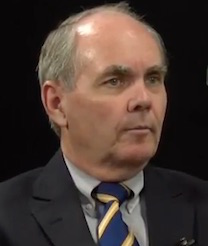By Bill Moore
Summer is, sadly, winding down. There is less than one month left before the autumnal equinox. On Saturday, Sept. 22 at 9:54 p.m. the sun traverses the celestial equator — the imaginary line in the sky above the Earth’s equator — from north to south, and without you having to do anything, the seasons will have changed.
Believe it or not, the unofficial end of summer takes place this weekend. Labor Day has sneaked up on us once again. Schools have already welcomed their classes, summer vacationers are now going to transform into “leaf peepers,” and before you know it, Mr. Claus will be making his appearance.

Bill Moore, president of Central Vermont Chamber of Commerce
Why do we celebrate the end of the summer? Importantly, why do we celebrate what is arguably the most casual of seasons by honoring labor?
The first recorded Labor Day was Sept. 5, 1882 in New York City, held and organized by the Central Labor Union. There is some dispute over who created Labor Day. Some maintain that Peter McGuire, general secretary of the Brotherhood of Carpenters and Joiners first proposed a day to honor labor. McGuire would later go on to co-found the American Federation of Labor.
According to the U.S. Department of Labor, “Recent research seems to support the contention that Matthew Maguire, later the secretary of Local 344 of the International Association of Machinists in Paterson, N.J., proposed the holiday in 1882 while serving as secretary of the Central Labor Union in New York. What is clear is that the Central Labor Union adopted a Labor Day proposal and appointed a committee to plan a demonstration and picnic.”
A grand parade was held as an estimated 10,000 workers took an unpaid day off and marched from City Hall to Union Square to demonstrate their strength and determination. The idea soon spread to other areas of the country and local celebrations were held in early September.
Between 1887 and 1894, a Labor Day holiday was adopted by 23 states, celebrating on either the first Saturday or first Monday of September.
In May of 1894, workers at the Pullman Palace Car Company in Chicago went on strike, protesting wage cuts and other labor issues. In June, Eugene Debs called for a nationwide boycott of Pullman cars, essentially shutting down the nation’s passenger rail system. President Grover Cleveland dispatched federal troops to Chicago to break the strike. Riots ensued, resulting in more than twelve deaths. In August, the strike was settled, the boycott ended, and the trains started rolling again.
The Congress, wanting to overcome significant protests against President Cleveland’s handling of the strike, rushed through legislation creating Labor Day. Amazingly, the measure passed both houses of Congress by unanimous votes. President Cleveland received the measure just six days after the strike ended.
Unfortunately for the Democrats and President Cleveland, the actions did little to placate voters. In the 1894 congressional mid-term elections, the Democrats lost 116 seats in the House (the biggest loss ever) and five Senate seats. President Cleveland, hurt by the Depression of 1892, the effects of the strike, the mid-term losses and other factors, was denied re-nomination by the Democrats in 1896 who chose William Jennings Bryan as their standard bearer. Republican William McKinley was ultimately elected.
Labor Day has been celebrated on the first Monday in September since 1895. American workers’ efforts and expertise are responsible for some of the greatest technological, scientific and creative advances the world has ever known. It is most appropriate that we recognize and applaud all who contribute and use their skills and talents to make America the great nation that we are.
Bill Moore is president and CEO of the Central Vermont Chamber of Commerce.



Labor Day, a recognition for all the workers big or small, educated or non educated that made this country what it is………… Great !!
So keep working as the Liberal Snowflakes feel they are entitled to what you have with there
socialist agenda ….. Ever notice there’s no ” Politician Day ” Oh yeah they only spend !!
American workers’ efforts and expertise are responsible for some of the greatest technological, scientific and creative advances the world has ever known……………!!